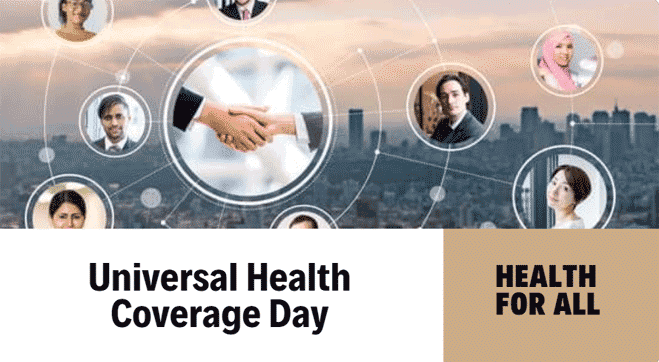International Universal Health Coverage Day is celebrated on December 12 every year to reinvoke the importance of global health equity. It also emphasises the need for every country to have a robust and efficient healthcare system to ensure health coverage for all. However, every country also has its own path to reaching global health equity, depending on its population, the nature of prevalent diseases, and much more.
Additionally, International Universal Health Coverage Day also focuses on the need for countries to attain the SDG health goal by combating different economic and environmental challenges that affect the health and wellness of their citizens. Read on to learn more about universal health coverage, the history and significance of the day, and its importance in leading to an overall global change in healthcare systems. 1
What is Universal Health Coverage?
Universal health coverage is a concept that is built on the foundation of ensuring equality in accessing medical services for every individual without financial hardships. It implies that every individual, irrespective of their economic status, should be able to avail of medical help whenever and wherever they need it.
Universal health coverage, in other words, promotes health equity in every sector of medical treatment, which involves preventive measures, treatment of the patients, rehabilitation in cases necessary, and palliative care.
The History of Universal Health Coverage Day
International Universal Health Coverage Day was first celebrated on December 12, 2012, when the United Nations passed a resolution encouraging every country to undertake universal health coverage. This day is celebrated to promote the belief that every individual must have access to equal and affordable medical facilities without any form of economic discrimination. Such an idea also encouraged countries to have a strong and resilient medical infrastructure with adequate care workers in order to support the medical needs of their citizens.2
In other words, International Universal Health Coverage Day is now celebrated to promote awareness amongst every individual and organisation about the importance of global healthcare equity by improving healthcare access for all. This day is also celebrated by bringing forward various stories of patients who still await proper medical treatment, setting future goals for the world regarding the importance of health coverage for all.
Importance of Universal Health Coverage
Access to proper and timely medical treatment has always been a concern owing to the highly different economic strata in every country. While the prevalence of this disparity is higher in developing nations, it persists across the globe. Universal Health Coverage is a concept that addresses the challenge of individuals accessing medical and care facilities without sufficient means. Thus, it is a day that addresses and ensures healthcare for underserved communities by ensuring greater affordability.
However, while the importance of universal health coverage lies in ensuring global healthcare equity, it also plays a huge role in spreading awareness on different diseases, how they can be tackled, and, most importantly, reiterating the role of the state in the same.
Universal Health Coverage sets forth an ideal path that the state should undertake in providing healthcare access to each and every segment of the population. It also helps the framing of an SDG health goal by spreading greater awareness about diseases, along with the medical and care facilities required for the same.
Focus Areas of the Universal Health Coverage Day 2024
The International Universal Health Coverage Day 2024’s theme is “Health: It’s on the Government.” 3
The slogan highlights the role of the state and government in ensuring global healthcare equity. The following are the focus areas of this day:
- Strengthening financial protection: To ensure the government allots enough finances to the healthcare sector to increase the affordability of medical facilities. This can be done by increasing the annual budget for healthcare services, introducing various innovations for better and faster treatment, etc.
- Raising awareness of the need for healthcare equity: Healthcare equity has been an underexplored topic for years, and the needs of the underprivileged sections have often been ignored or masked. On the other hand, this group is most susceptible to most diseases. Hence, one of the primary focal points of this day is to ensure greater awareness amongst individuals about the need for global health equity and how that can help in the overall progress of society.
- Sharing people’s stories: Unreserved sections of society often suffer from fatal diseases and succumb to the same due to the lack of proper and accessible medical treatment.
Key Challenges to Achieving Universal Health Coverage
Achieving Universal Health Coverage (UHC) involves significant obstacles, particularly in low- and middle-income countries. Financial barriers are one of the primary challenges, as many countries lack the resources to fund comprehensive health coverage for all citizens. Political instability also hampers progress, as changing administrations and policy shifts can interrupt or reverse advancements in healthcare reforms.
In addition to funding, there are logistical and infrastructural issues, particularly in rural and remote areas, where healthcare facilities and qualified professionals are often lacking. High out-of-pocket healthcare costs further prevent millions of people from accessing essential services, particularly preventative care. These challenges highlight the need for concerted global efforts and resource mobilisation to ensure that healthcare equity and improving healthcare access become realities for all.
Key Facts and Statistics on UHC (2024)
Global Progress
According to the World Health Organization (WHO), over 45% of the global population still lacks full UHC coverage as of 2024. Despite this, many countries have made significant progress toward improving healthcare equity and expanding coverage. The gaps in UHC coverage are more pronounced in low- as well as middle-income countries, where limited resources, political instability, and economic challenges hinder the ability to provide healthcare services to all citizens.
However, numerous nations have been working to implement universal health systems or have taken steps to increase access to health services through reforms such as expanding insurance coverage, improving healthcare infrastructure, and integrating community-based healthcare initiatives. Even with these advancements, the journey to full UHC is a long-term process that requires addressing both financial and structural barriers to access. 4
Financial Access
An estimated 930 million people around the world are forced to endure catastrophic health expenditures each year. These individuals face the harsh reality that the cost of medical care pushes them into poverty, either by depleting savings or by forcing them to take on high levels of debt. For many low-income families, health costs—whether from treatment, hospitalisation, or medication—are a significant financial burden, and the lack of a robust insurance system exacerbates this challenge. When people face high out-of-pocket expenses for healthcare, they may delay seeking care, leading to more serious health issues down the line, or they may forgo necessary treatments altogether. This cycle creates a barrier to healthcare for underserved communities and perpetuates cycles of poverty.
Workforce Shortages
The projected shortage of 10 million healthcare workers by 2030 is another major hurdle in achieving UHC. These shortages are particularly acute in low-income countries, where the ratio of healthcare providers to the population is significantly lower. This shortage of skilled professionals—doctors, nurses, pharmacists, and technicians—directly impacts the quality and availability of healthcare services. Many healthcare systems in developing countries struggle to provide even basic services, and rural areas are often hit hardest due to difficulties in recruiting and retaining health professionals. Inadequate healthcare workforce distribution is a critical issue in achieving global health equity because access to health services is not just about infrastructure but also about having qualified personnel available to provide care. 5
Policy Impact
A significant policy-related factor in achieving UHC is financial investment. Countries that invest more than 5% of their GDP into healthcare are generally closer to achieving UHC goals. This investment allows governments to improve their healthcare infrastructure, pay for essential services, and provide universal coverage for medical costs. However, despite the proven link between increased investment and better healthcare outcomes, many countries still fall short of this benchmark. Limited government budgets, competing priorities, and inefficient healthcare spending are among the key reasons why some countries are unable to reach the 5% threshold. This gap underscores the need for increased political will and policy reforms to prioritise healthcare and close the financing gap.
By addressing these issues—such as expanding workforce capacity, improving financial access, and making strategic investments—countries can move closer to achieving UHC, ensuring that healthcare is both affordable and accessible to all.
How Does International UHC Day Help Drive Change?
Observed annually on December 12, International Universal Health Coverage Day (UHC Day) plays a vital role in advocating for healthcare as a fundamental human right. This day brings global awareness to the importance of universal health coverage, mobilising government bodies, organisations, and individuals to support policies aimed at healthcare inclusivity. By creating a platform for dialogue and sharing successful initiatives, Universal Health Coverage Day 2024 fosters collaboration among countries to tackle common global healthcare challenges.
Through events, campaigns, and discussions, World Health Awareness Days 2024 also highlights ongoing health disparities and encourages the sharing of research and data that can inform better healthcare practices worldwide. The visibility and political momentum generated on this day help reinforce the commitment of governments and stakeholders to make UHC a priority.
Steps Toward Achieving Universal Health Coverage
Global Progress:
According to the World Health Organization (WHO), more than 45% of the global population still lacks full UHC coverage as of 2024. Despite this, many countries have made significant progress toward improving healthcare equity and expanding coverage. The gaps in UHC coverage are more pronounced in low- and middle-income countries, where political instability, limited resources and economic challenges hinder the ability to provide healthcare services to all citizens. However, numerous nations have been working to implement universal health systems or have taken steps to increase access to health services through reforms such as expanding insurance coverage, improving healthcare infrastructure, and integrating community-based healthcare initiatives. Even with these advancements, the journey to full UHC is a long-term process that requires addressing both financial and structural barriers to access. 6
Financial Access:
An estimated 930 million people around the world are forced to endure catastrophic health expenditures each year. These individuals face the harsh reality that the cost of medical care pushes them into poverty, either by depleting savings or by forcing them to take on high levels of debt. This cycle creates a barrier to healthcare for underserved communities and perpetuates cycles of poverty.
Workforce Shortages:
The projected shortage of 10 million healthcare workers by 2030 is another major hurdle in achieving UHC. These shortages are particularly acute in low-income countries, where the ratio of healthcare providers to the population is significantly lower. Inadequate healthcare workforce distribution is a critical issue in achieving global health equity because access to health services is not just about infrastructure but also about having qualified personnel available to provide care.
Policy Impact:
A significant policy-related factor in achieving UHC is financial investment. Countries that invest more than 5% of their GDP into healthcare are generally closer to achieving UHC goals. This investment allows governments to improve their healthcare infrastructure, pay for essential services, and provide universal coverage for medical costs. This gap underscores the need for increased political will and policy reforms to prioritise healthcare and close the financing gap.
- By addressing these issues—such as expanding workforce capacity, improving financial access, and making strategic investments—countries can move closer to achieving UHC, ensuring that healthcare is both affordable and accessible to all.
These statistics emphasise the ongoing need for strategic investment and international cooperation to bridge the gaps in healthcare access.
Conclusion
What is Universal Health Coverage? It is not only a goal but a necessity for promoting global health equity and reducing poverty. While challenges remain, initiatives like International Universal Health Coverage Day help to build awareness and foster partnerships that drive meaningful change and offer universal health coverage benefits. By prioritising investments in primary care, addressing financial barriers, and enhancing healthcare infrastructure, the global community can make strides toward a world where everyone has access to the health services they need. Although the road to UHC is long, each step brings us closer to realising health as a universal human right.








